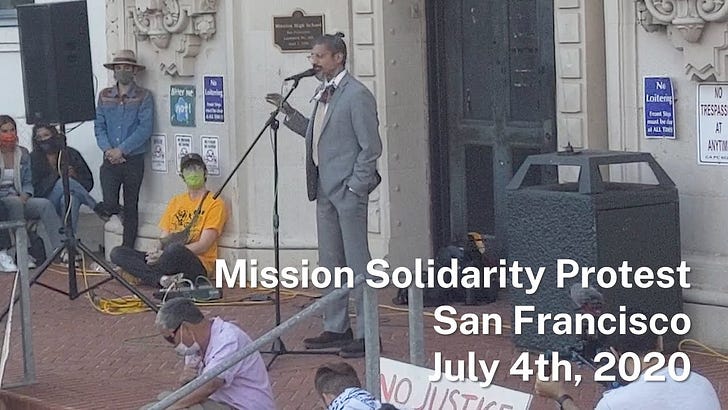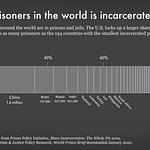This week, the Nation published a quite thoughtful oped assessing the profound threat to constitutional rights and freedom of conscience posed by illegal government surveillance. Author Patrick Toomey focused on the more or less total failure of the federal courts over the past generation to do their jobs in guarding constitutional rights from an executive branch run amok, prompted by the Supreme Court’s recent decision to ignore an appeal by the Wikimedia Foundation challenging illegal mass surveillance by the National Security Agency.
[T]he press can’t be relied upon to guard or even recognize its own rights, let alone do the hard work of protecting democracy from government crimes committed in secret.
While I’m grateful for attention to an issue that has defined my career over the past two decades, it is remarkably convenient for a major publication to finally wake up and smell the coffee by publishing Toomey’s oped in 2023, after having previously failed to cover congressional campaigns championing precisely the issues that editors now performatively claim to care about—only decades after the problem already grew entrenched.


Worse yet, the press has abandoned not only its constitutional function, and public responsibility to expose government crimes (including mass surveillance and its many impacts on dissent and our communities), but in the process, abandoned constitutional rights both in the abstract, and even particularly those on which the press itself relies.
In other words, the press can’t be relied upon to guard—or even recognize—its own rights, let alone do the hard work of protecting democracy from government crimes committed in secret.
In the end, it is democracy that suffers.
If you find this post informative, please consider subscribing to hear perspectives you won’t find in corporate news outlets.
Focusing on the courts while ignoring Congress
As far as Toomey’s oped goes, I find little fault with it beyond its predictable underinclusion. It was written, after all, by an advocate from the ACLU, the American Civil Liberties Union. The organization has long challenged government surveillance programs, but remains institutionally focused on courts. Both the national network and its various state affiliates concentrate on impact litigation (filing lawsuits to impact public policy), with some work focused on elected legislatures, but little to none addressing political campaigns to challenge candidates or shift their policy positions.
Part of the ACLU’s strategic commitment to courts is intrinsic to nonprofits generally. Under Section 501(c)(3) of the federal tax code, many exchange the ability to opine about electoral contests in exchange for the authority to offer tax deductibility to its donors. The ACLU and many of its state affiliates do work with sister organizations organized under Section 501(c)(4), which permits non-profit lobbying—but even they are restrained from engaging in electioneering.
Beyond its legal restrictions, the strategic commitment of organizations like the ACLU to impact litigation also reflects an unfortunate inability to adapt to the times.
The ACLU, like the NAACP Legal Defense Fund, won many victories in the mid-20th century, during an era when federal courts grew quite aggressive in responding to structural injustice. But in the decades since groundbreaking decisions like Brown v Board (desegregating schools), Batson v Kentucky (ending all white juries) and Miranda v Arizona (ensuring notice of rights to people suspected of having committed a crime), our federal courts have been dramatically transformed through a combination of weaponized appointments, a pattern of “Kabuki theater” preventing the Senate from attaining meaningful oversight in confirmation hearings, a disappointing failure to retire by a liberal justice seemingly oblivious to the political context in which the courts operate, and the impunity of right wing jurists for ethical violations and professional failures both before and after reaching the bench.
Just last year, the Supreme Court effectively reversed its historic Miranda decision by eliminating any remedy for government violations. It previously did the same thing to Roe v Wade—not in 2022, but in 2007, the same year it also substantially overruled Brown v Board without admitting to doing so. While the Court assaulted its own precedents, non-profits committed to impact litigation played along, refusing to politicize the increasingly political Court out of fear of alienating Justices before whom they would have to argue in the future.
All that is to say: it makes sense for an ACLU employee to write an oped focused on the courts, since that’s where organization focuses (whether or not that strategy makes sense anymore).
But there’s no good reason for editors to privilege analysis of the courts over observations about political campaigns that aim to place these issues in courts of public opinion. That’s especially true since the courts have proven so absent, and the political branches so thoroughly complicit across both corporate parties.
[I could go on a tangent here about the structural inability of courts to show up for work, having previously marginalized themselves—but I’ll save that for later. Paid subscribers with an interest in digging deeper can read that analysis below, behind the paywall.]
Want to learn more about the roots—and many branches—of bipartisan corruption in Washington?
Mass surveillance offends democracy—and your rights
Mass surveillance is constitutionally troubling for many reasons, not the least of which is that it violates the Fourth Amendment right against unreasonable searches and seizures. Courts have long required police, for instance, to establish at least reasonable suspicion of a criminal offense before even so much as simply patting someone down for weapons—yet authorities have claimed access to the most private thoughts, correspondence, and financial transactions of hundreds of millions of Americans (and billions of others beyond us) without any basis of suspicion at all.
The fault lies with corruption in government, and the many actors who enable it….
Many have characterized this erosion of rights as “technology outpacing the law,” which is both foolish and charitable. It is true that technology enabled our government to weaponize its powers and circumvent previous legal restrictions, but the technology has been, as it always is, nothing more than a tool.
The fault lies with corruption in government, and the many actors who enable it—from insider trading Members of Congress who place their private fortunes before the public interest, to the complicit editors of publications who insulate them from public accountability.
The unconstitutional mass surveillance regime has also eroded First Amendment rights and freedom of conscience, belief, association, and expression. We’ll come back to that in a minute.
Corruption hiding in plain sight
Apologists for mass surveillance claim that it has been focused exclusively on ensuring national security. The evidence, however, suggests otherwise: the NSA has caught an untold number of agents misusing the government’s powerful domestic spying tools not to track national security threats, but instead to monitor their former lovers or spouses.
Meanwhile, the specter of unaccountable government openly politicizing the surveillance apparatus renders it only as trustworthy as the figures at the top of (or, frankly, anywhere within) the executive branch.
Given the recent history of the presidency, there is absolutely no good reason for anyone to feel any degree of assurance that the system will not be used for the craven and corrupt purposes of advancing someone’s political agenda, or even perhaps the fortune of a self-interested public official. Enlarging their private fortunes does, after all, seem to be the one thing that unites Democrats & Republicans in Washington.
The press won’t even stand up for itself, let alone democracy
Another reason that surveillance is constitutionally offensive is that it undermines the right of association protected by the First Amendment. Rather than merely protect speech, as many think, the First Amendment actually protects five distinct political rights (belief, association, speech, publication, and advocacy), which together comprise what NYU law professor Brett Neuborne describes as “Madison’s Music.”
Editors…have routinely ignored advocates and whistleblowers—in addition to congressional candidates who have stood with them and constitutional rights—while choosing to instead privilege self-serving government sources to construct an artificial veneer of bipartisan legitimacy surrounding programs that have never enjoyed any basis for legality.
Alas, the Supreme Court (in 1976 and then again in 2010) made the indefensible decision to treat political campaign contributions like speech, undermining the founders’ vision of political process rights by turning our democracy over to the highest (usually, a corporate) bidder.
But even setting aside the Supreme Court’s abandonment of the First Amendment’s purposes in its jurisprudence [explored more deeply in the 2012 article to which I link after the paywall below], it is unfortunately clear from the record that even editors have abandoned their own rights, long before ever facing judges.
The right of association, in particular, has vital importance to news organizations that rely on source anonymity to gain access to information from whistleblowers and government officials who are not authorized to speak on a public record. Because government surveillance renders whistleblowers at ever increasing risk of exposure, news organizations have lost a pipeline to vital sources of information.
Editors recognize this problem, so much so that they have taken steps through technology (more so than their journalism) to respond. The Secure Drop system developed by the Freedom of the Press Foundation has offered a critical tool for investigative journalists to offer continuing anonymity to sources who wish not to be identified.
But despite embracing technology to address their vulnerability to government monitoring, most publications and news organizations have completely abdicated the parallel responsibility to inform the public about why they go to such lengths, or why such lengths matter at all in the broader context of defending democracy from demagoguery.
There have been no shortage of opportunities for the press to show up. Concerns about illegal mass surveillance have emerged from both sides of the partisan aisle, and prompted reform campaigns at the local and state level across the country, in addition to closely contested federal campaigns like the one I mounted in 2020.
Editors, however, have routinely ignored advocates and whistleblowers—in addition to congressional candidates who have stood with them and constitutional rights—while choosing to instead privilege self-serving government sources to construct an artificial veneer of bipartisan legitimacy surrounding programs that have never enjoyed any basis for legality.
Obvious questions have gone unasked by journalists, leaving to activists and advocates the job abandoned by editors. My arrest in the U.S. Senate in 2015 was prompted by this pattern: I asked an important question (as it happens, about impunity for illegal mass surveillance, juxtaposed with the relentless, so-called “justice” that leaves innocent Americans with dark skin dead at the hands of paid public servants with disturbing frequency) that no journalist has ever demonstrated the independence to ask any public official anywhere in the country.
Writing in the Nation, Toomey fairly bemoans the failures of federal judges to intervene. Several judges, however, have issued scathing rulings attempting to rein in the surveillance state, only to be overruled by superior courts, ultimately beholden to the authoritarian consensus that defines the current majority of the Supreme Court.
The crux of their deference has been the state secrets doctrine, a judicially contrived rule announced in a case later revealed to be a quintessential military cover-up that has allowed the White House in recent years to suppress public knowledge of everything from mass surveillance to the CIA’s role in international human rights abuses including torture with impunity, the FBI’s infiltrating mosques around the country, and God only knows what else.
Observing the continuing rightward shift in American jurisprudence, many have suggested that elections have consequences. That is precisely why I feel compelled to explain the institutional failure of press outlets across the United States, including the Nation and nearly every news organization in this country. The only hope for a better jurisprudence and more defensible policymaking is for the press to finally start informing the public about the bipartisan corruption that provides Washington.
But when editors of major publications address vital issues only decades after the fact, after having ignored political candidates who championed those issues in real time, they reduce themselves to entertainment.
Democracy in crisis
Americans pretend that our media ecosystem is more trustworthy than those in countries in which the outlets are formally state owned, but between corporate consolidation, access journalism, and deference to government secrecy, our supposedly “Free Press” has little credibility left.
The recurring exposure of government lies after the fact of every armed conflict initiated by the Pentagon over the last three generations is reason enough to be skeptical of today’s escalating warmongering in Washington. Our military industrial complex is currently stoking conflict vis-à-vis two nuclear armed powers at the same time—yet rather than offer any independent analysis, media outlets in the U.S. have yet again played their reliable roles as cheerleaders for war.
I’m reminded of how Malcolm X responded after he was neutralized (but before he was killed), by going on an international tour to expose the contradictions and illegitimacy of America’s position in the international arena, claiming to stand for democracy and human rights while denying basic rights to many of its own citizens. I see in Brother Malcolm’s example a lesson to seek new arenas in which to challenge the foundations of those that we were forced to abandon. Having been pushed out of electoral politics by the racist corruption and political co-optation of editors & journalists, I am eager to expose their complicity by doing the important work they unfortunately abandoned.
Assessing the credibility of voices who claim to care about principles only after the fact, and only in moments when they are not politically contested, is a crucial component of accountability. The first step to defending our democracy is to hold accountable the editors whose failures have grown so unfortunately routine.
By reading independent voices that offer the analysis and perspective you won’t find from news organizations, you’re doing that right now.
Paid subscribers can learn more from a keynote speech I delivered at a law symposium in Chicago about a decade ago. It addresses a wide range of themes, including the illegality of CIA drone strikes and unreliability of even the Obama administration’s supposedly limiting principles. It also touches on the marginalization of courts at the hands of judges who, like their counterparts in the press, routinely defer to executive secrecy, abandoning human rights and accountability in the process.
Listen to this episode with a 7-day free trial
Subscribe to Chronicles of a Dying Empire to listen to this post and get 7 days of free access to the full post archives.













